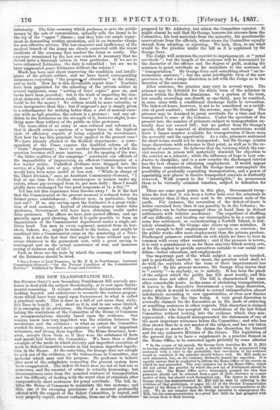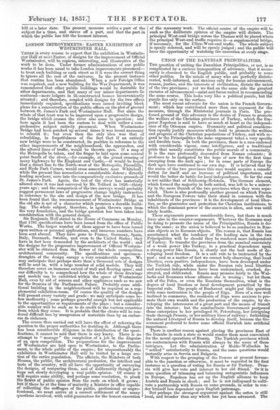THE NEW TRANSPORTATION BILL.
SIR GEORGE GREY'S new Secondary Punishment Bill scarcely professes to deal with the subject theoretically, or to rest upon fundamental reasoning. It accepts authoritative declarations without looking beyond, and endeavours to reconcile the various propositions which have been urged upon Government in what is called a practical mode. This is done in a bill of not more than sixtyfive lines in length ; yet, short as it is, and in one sense limited, it is sweeping in its provisions. Sir George assumes the right of taking the resolutions of the Committee of the House of Commons as recommendations directly based upon the evidence. Our readers know how very imperfect was the relation between the resolutions and the evidence ; to what an extent the Committee evaded its duty, recorded mere opinions or notions of important witnesses, and strung them together. The Home Secretary, however, accepts these dicta as if they were the substance of facts and proofs laid before the Committee. We have thus a direct example of the mode in which slovenly and imperfect execution of work in Select Committee results in bad because imperfect legislation in the House. At the same time, Sir George does not scruple to pick out of the evidence, or the transactions in Committee, any material which may suit his purpose. He professes to believe that most of the complaints respecting the present system have been exaggerated. The ticket-of-leave men are not so bad nor so numerous, and the amount of crime is actually decreasing ; but inconveniences arise from the nominal sentence of transportation and the difficulty of dealing with the worst class of criminals after comparatively short sentences for penal servitude. The bill invites the House of Commons to assimilate the two systems • and this, one of the sweeping provisions of a measure profe;sedly offered with the support of the Select Committee, is copied, and very properly copied, almost verbatim, from one of the resolutions proposed by Mr. Adderley, but which the Committee rejected. It might almost be said that Sir George borrows his excuses from the Committee, his best materials from the minority, his questionable reservations from the officials, whose views the Committee equally shrank from adopting or rejecting. We look, then to see what would be the practice under the bill as it is explained by Sir George Grey. The Judge will sentence the convict to imprisonment, or "penal servitude"; ; but the length of the sentence will be determined by the character of the offence and the degree of guilt, making the sentence to penal servitude so far assimilate to the sentence of "transportation?' Sir George Grey said something about "an intermediate sentence " ; but the most intelligible view of the new provision is that alarge discretion is left with the Judge as to the duration of the sentence.
After sentence, the practice may vary in several ways. The prisoner may be detained for the whole term of the sentence in prison within the British dominions. Or a portion of the term, not usually exceeding one-fourth or one-third, may be remitted, in some eases with a conditional discharge liable to revocation. The ticket-of-leave, however, is not to be considered as a certificate of good conduct ; rather the reverse, says Sir George. The prisoner may be detained in penal servitude for a time and then transported to some of the Colonies. Under the operation of the present law, the number of prisoners subject to transportation annually does not exceed 2O; but we gather from Sir George's speech, that the removal of distinctions and restrictions would leave a larger number available for transportation if there were the necessity and the opportunity. As a rule prisoners sentenced for short terms would not be transported ; lnit Sir George retains large discretions with reference to that point, as well as to the remission of sentences. He believes that the training which the convict receives in prison will materially diminish the objection to the convict as a colonist ; while the influence of hope is very conducive to discipline, and in a new country the discharged convict has the best chance of obtaining employment. It would appear from these considerations, that Sir George must contemplate the possibility of gradually expanding transportation, and a power of appointing new places to receive transported convicts is distinctly reserved. With respect to the "incorrigible," he pronounces them to be virtually criminal lunatics, subject to detention for life.
There are some good points in this plan. Government recognizes the fact that it can keep a better hold over the criminals in this country than if they were sent to the uttermost ends of the earth. For instance, the revocation of the ticket-of-leave is better exercised here than it can possibly be in the Colonies ; incorrigibles can be better managed close at hand than in distant settlements with inferior machinery. The expedient of shuffling off our difficulty, and landing our incorrigibles to be a curse upon some free settlement, or reconstructing a Norfolk Island, is definitely abandoned. Sir George also clears up some mistakes. It is easy enough to find employment for convicts as convicts ; for the public works offer more employment than the prisons produce. Discharged prisoners constitute an evil which we have to bear in common with every other country ; and if the pressure is severe, it is only a punishment to us for those sins into which society errs, or for the neglect to provide correctives suitable to our social condition—better education and employment. One important part of the whole subject is scarcely touched, and is practically omitted: we mean, the question what shall we do with the convicts after the term of their imprisonment has expired ? By his present measure, Sir George Grey leaves that to"society "—to anybody, or to nobody. It has been the pinch of the subject which the public has felt most keenly, and this measure does not affect it. The bill is characterized by some other remarkable traits. In the name of abolishing transportation, it leaves to the Executive Government a very large discretion, under which it would be enabled to extend transportation almost indefinitely according to new opportunities, or even new fancies in the Minister for the time being. A very great discretion is avowedly claimed for the Executive as to the mode of enforcing or remitting sentences in other respectsThis discretion is claimed by a Minister who has accepted the resolutions of the last Select Committee without looking into the evidence which they misrepresented; who himself misrepresented the statements of one of the most important witnesses before the Committee ; and who has thus shown that he is not master of the subject, and has not taken direct steps to master it.* He claims the discretion for himself and for any unknown Minister of the future. The legislation of the present day is to have a supplement in a practice framed in the Home Office, to be corrected again probably by some ulterior
4' In the course of his speech, Sir George Grey describes Mr. M. D. Hill as having admitted that he had made a mistake when he pronounced long sentences with a view to the probability that two-thirds of the sentence would be remitted if the prisoner should behave well. Mr. Hill made no such admission, but, on the contrary, distinctly denied the aspersion. It is equally untrue that he neglected to inform the Home Office of the course on which he had proceeded. The real omission lay in the Home Office, which did not advise the practice by which the new act of Parliament should be carried out. The Home Office never thoroughly grasped the idea that prisoners should not be released from a part of their sentence as a mere matter of date, but should work themselves out. The degree in which Sir George Grey has misrepresented Mr. Hill will be seen by referring to the evidence of that gentleman, at pages 13-17 of the Second Transportation Report of the House of Commons in 1856, and in the correspondence at the end. We do not imagine that Sir George intended to misrepresent Mr. Hill, but his misrepresentation is a proof how little he had grappled with the actual facts or their bearing.
bill at a later date. The present measure settles a part of the subject for a time, and staves off a part, and that the part in which the public has felt the keenest interest.



























 Previous page
Previous page